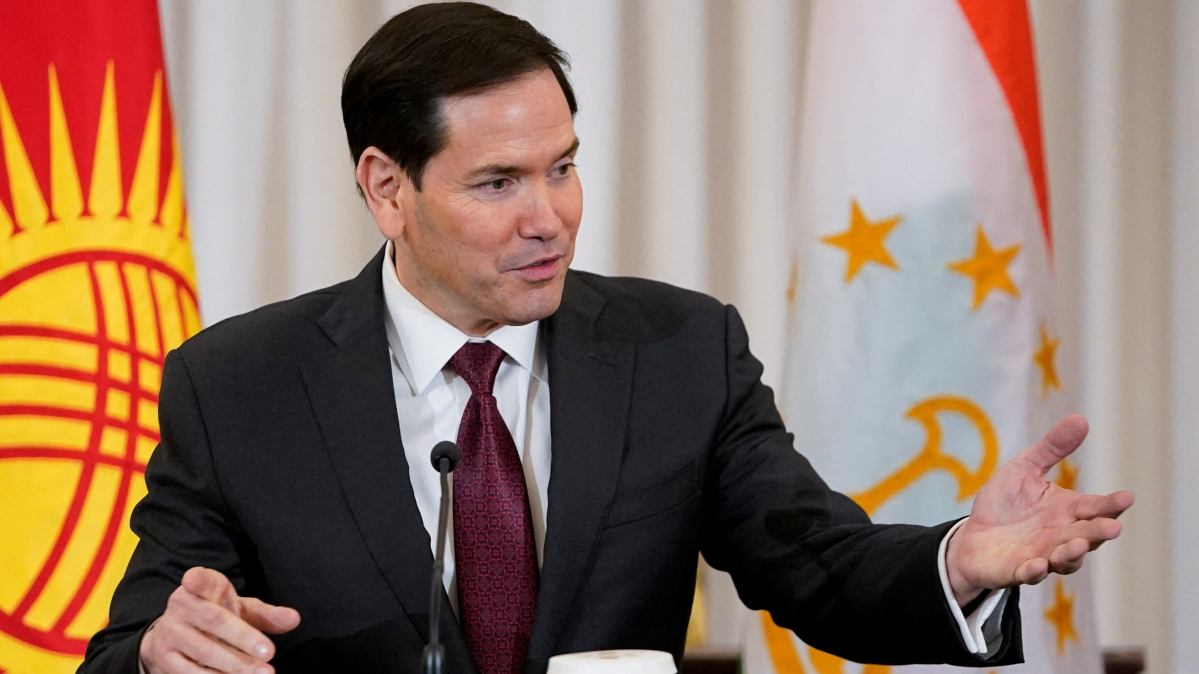Columbia student from Azerbaijan detained by U.S. immigration agents, sparking campus protest
A student from Azerbaijan was detained by U.S. immigration agents inside a Columbia University residential building on Thursday morning, was released ...

U.S. Secretary of State Marco Rubio announced plans to visit all five Central Asian countries next year, as President Donald Trump prepares to host their leaders in Washington for talks focused on energy and mineral cooperation.
Rubio made the announcement on Wednesday during a reception at the State Department, part of a broader Trump administration initiative to deepen ties with the resource-rich region, adding the visits could be during a week-long regional tour.
The upcoming meeting in Washington will bring together the presidents of Kazakhstan, Kyrgyzstan, Tajikistan, Turkmenistan, and Uzbekistan for discussions expected to focus on rare earths and other strategic resources.
Rubio said U.S. and Central Asian interests are aligned in developing the nations’ vast natural wealth.
"You are looking to take the resources ... that God has blessed your nations with, and turn them into responsible development that allow you to diversify your economies," he said.
Building momentum for economic partnerships
Deputy Secretary of State Christopher Landau noted that Trump’s invitation to the five leaders reflected the president’s personal effort to strengthen U.S. engagement in Central Asia. Landau and Sergio Gor, the U.S. ambassador to India and Trump’s special envoy to Central Asia, travelled to Kazakhstan and Uzbekistan last week to prepare agreements to be unveiled during the leaders’ visit.
“The opportunities are amazing - business opportunities. Many ways to partner there,” Landau said, emphasising prospects in energy, infrastructure, and trade.
The five Central Asian countries have long maintained close economic relations with both Russia and China, shaped by geography, trade, and infrastructure ties. Moscow remains a major destination for labour migration and energy exports, while Beijing has invested heavily in transport corridors and industrial projects through its Belt and Road Initiative.
The United States is now seeking to expand its engagement with the region, focusing on critical minerals, energy cooperation, and economic diversification. Officials describe the effort as a step toward balanced and mutually beneficial partnerships.
Republican Senator James Risch, who also spoke at the event, said he would introduce a bill this week to repeal the Cold War-era Jackson–Vanik amendment, which restricts U.S. trade with non-market economies. The move could pave the way for stronger economic engagement with Central Asian countries as Washington seeks new partners in a shifting global trade landscape.
A F-16 fighter jet of the Turkish Air Force crashed near a highway in western Türkiye early on Wednesday (25 February), killing its pilot, officials and media reports confirmed.
Chinese President Xi Jinping and German Chancellor Friedrich Merz agreed on Wednesday in Beijing to strengthen economic cooperation while addressing trade imbalances, market access concerns, and the war in Ukraine, during Merz’s first official visit to China since taking office.
U.S. President Donald Trump declared a “golden age” for America in his first second-term State of the Union on Tuesday evening, delivering the longest-ever address at more than 90 minutes. Here are the main takeaways.
President Donald Trump delivered the first State of the Union address of his second term to Congress on Wednesday (25 February), declaring that America’s “golden age” had begun and that the country was experiencing a “turnaround for the ages.”
Start your day informed with AnewZ Morning Brief. Here are the top news stories for the 25th of February, covering the latest developments you need to know.
Pakistan’s Foreign Minister Ishaq Dar received a phone call from Qatar’s Deputy Foreign Minister Mohammed bin Abdulaziz Al-Khulaifi on Thursday, as fresh border clashes erupted between Pakistani and Afghan forces.
Ankara has rejected media reports claiming it plans to deploy military forces into Iranian territory in the event of a U.S. attack on the Islamic republic.
Georgia’s path towards European Union membership is facing its most serious crisis to date, with senior European lawmakers warning that the country is now a “candidate in name only” and accusing the ruling government of reversing democratic progress and drifting away from Europe.
As Iran and the United States continue with nuclear talks in Geneva on Thursday, Tehran’s extensive ballistic missile programme remains a central point of contention.
More than 11 million Afghans have been displaced or have returned to the country between 2021 and 2025, as drought, floods and mass returns from neighbouring states deepen an already fragile humanitarian crisis, according to a new report from the International Organization for Migration (IOM).
You can download the AnewZ application from Play Store and the App Store.

What is your opinion on this topic?
Leave the first comment